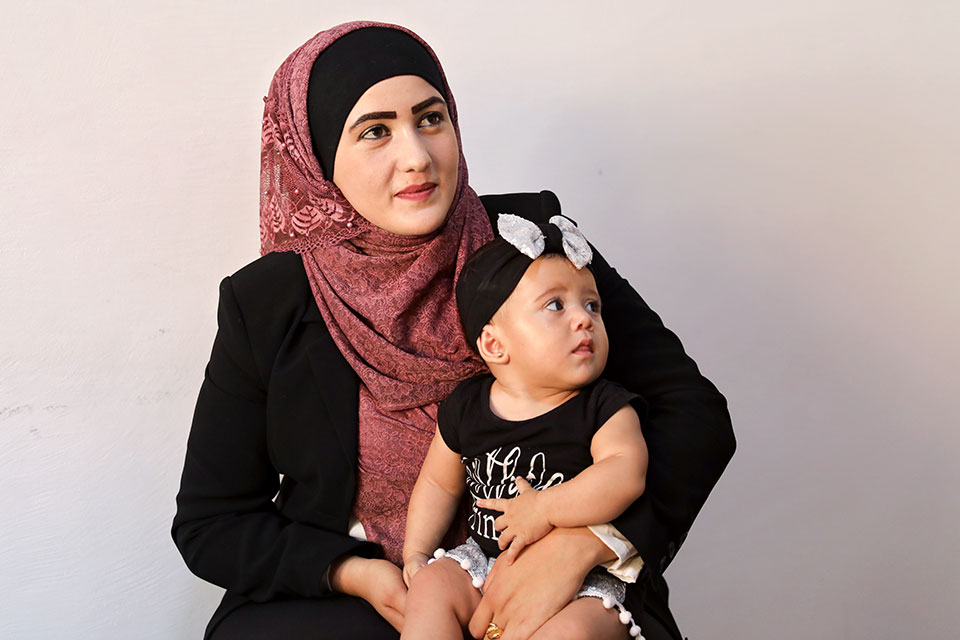Community centres at the forefront of protection, prevention and response services to vulnerable women and girls in Jordan
Dunya Khalil* and Basma Hamed* are both survivors of domestic violence. Living in a rural area, with limited livelihood opportunities and confronted with the need to provide for their children, they found protection support and counselling services at the women and girls’ centre in Ajloun operated by the Institute for Family Health and UN Women, with the generous support of the Government of Japan.Date:

At 21, Dunya Khalil* left husband and fled to her family in Ajloun. “I married when I was 17 years-old. Seven months into the marriage, unable to stand the abuse, I finally had the courage to flee.” By then, she was pregnant.
Khalil wanted to start a new life, but felt like she had no one to turn to until she discovered the women and girls’ centre operated by the Institute for Family Health in Ajloun, supported by UN Women. The centre offers protection, prevention and response services for women and girls who have experienced violence. Khalil enrolled in the prenatal assistance and psychological support services provided by the centre.
“I had a renewed lease of life after attending a few of the counseling sessions,” she says.
The centre runs regular workshops to equip women with life skills and empower them to engage in their community. Khalil soon joined the handicraft workshop, which allowed her to utilize the skills she learned to sell products in her community. “Now I can imagine a future for my child and me.” Like many survivors of violence, finding means to economically support herself was crucial for Khalil.
And Khalil’s story is not unique. In Jordan, 24 per cent of women aged 15-49 years old report experiencing physical and/or sexual violence at least once in their lifetime[1].
Basma Hamed*, 55, suffered for years before turning to the centre. She had been battling with depression for five years since losing her son in a tragic accident. With five children and an abusive husband, Hamed had lost all hope.
A woman who had sought the services of the centre persuaded Hamed to join her for a day. “As soon as I stepped into the centre, I felt like I had a new home,” Soon, she was attending weekly therapy sessions with a psychologist.
Basma Hamed, Dunya Khalil and many other women in Ajloun joined the life skills and capacity building workshops provided in the centre.
Now, Hamed sells both an assortment of handcrafted soap and sandwiches at her local market every morning. “I feel like I am doing the work of 20 men in one day, and it makes me proud!”
She continues to attend psychological support sessions in the centre on a weekly basis. “I have learned that inner fulfillment is important,” she says. “Filling my day with positivity has not only impacted my life but my family too. Being able to financially support my children has been rewarding, but being able to empower them and ensure a brighter future for them has been a dream come true.”
With the generous support of the Government of Japan under the “Women’s Leadership, Empowerment, Access & Protection in Crisis Response (LEAP)” programme, UN Women is partnering with the Institute for Family Health to provide critical sexual and gender-based violence prevention and response services, as well as health care and family planning counselling. The centres located in the northern governorates of Ajloun and Jarash in Jordan, reaches more than 6,000 women every year.
“Community centres play a vital role in providing multi-sectoral protection services, where women and girls can find a safe space for counselling and to break the cycle of silence,” said Ziad Sheikh, UN Women Country Representative in Jordan during a recent visit to the Ajloun centre. “UN Women addresses the multi-faceted issue of gender-based violence through a holistic approach in collaboration with its partners, where combined skills-building and awareness raising efforts contribute to the empowerment of vulnerable women and girls.”
Dunya Khalil and Basma Hamed continue to frequent the centre on a regular basis, attending sessions and gathering with their new friends. Both of the women aspire to continue bettering their own lives, building their businesses and inspiring other women to do the same.
*The names have been changed to protect the identity of the survivors.
Notes
[1] Department of Statistics [Jordan] and ICF International, 2013. Jordan Population and Family Health Survey 2012. Calverton, Maryland, USA: Department of Statistics and ICF International, via UN Women’s global database on ending violence against women.